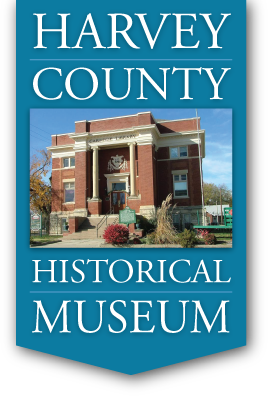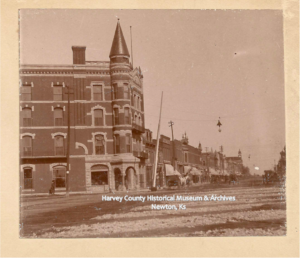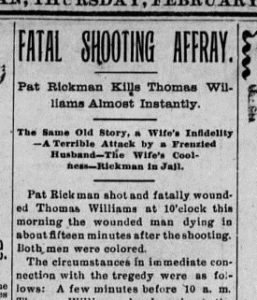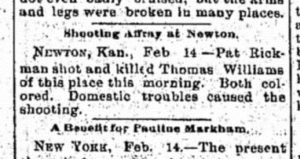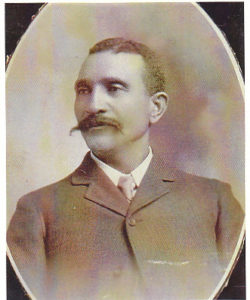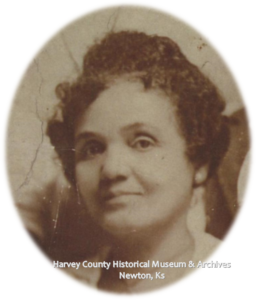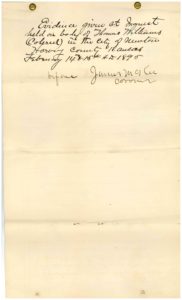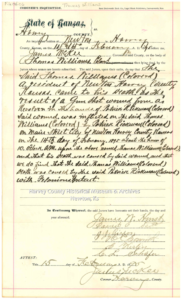by Kristine Schmucker, HCHM Curator
Part 1 of 2 posts.
Shortly before 10:00 on Thursday morning, February 14, 1895, Thomas Williams, the head cook for the Clark Hotel, stepped out of P. Byer’s Store at 421 Main after placing an order. He walked south toward the Clark Hotel and had reached Fred Brandt’s place when Patrick Rickman rushed out.
Some eyewitnesses said that Rickman shouted, “Now I’ve got you!” before shooting his No. 44 Colt Navy Revolver at Williams. Williams ran and Rickman fired again hitting Williams in the back. Rickman then chased Williams. The two continued to fight. Rickman threw Williams down the stairway to a basement on the south side of the Clark Hotel. He continued to beat Williams with the gun handle. One observer described Rickman as “insane with rage” and Williams “powerless to help himself.”
Marshall Ainsworth came to the scene and tried to disarm Rickman with little success. Two men, W.C. Conrad and Mart Covert, tried to help. Finally, Covert gave two blows to the head and was able to daze Rickman enough that Ainsworth was able to get the gun away. By the time they were able to separate the two men six shots had been fired. Williams had a gun shot wound and was severely beaten.
Williams was carried to Dr. O.W. Roff, where he was pronounced dead.
Rickman was taken to a nearby drug store where Dr. Miller tried to take care of his wounds, but found that Rickman was “still in a frenzied condition.” The doctor recalled that Rickman “had the appearance of a maniac and it was with difficulty that he was approached.”
In the Coroner’s Inquisition later that day, it was noted that Rickman shot and killed a man on Main street and “more than hundred men saw the brutal act.”
Thomas Williams, a Black man, was roughly 30 years of age, described as “quiet, industrious, quite a flashy dresser.” He had worked for Van Duyn, manager at the Clark Hotel, for 4-5 years. The initial newspaper reports note that he had a wife and child. The report also noted that this “was not the first experience of this sort” involving Williams. However, “for a good number of years he has borne a good reputation.”
Patrick Rickman was well-known in Newton and described as “a powerfully built negro of large mold and fine physical build, about 35 years . . . one-eighth Indian and has always been a steady and industrious man.” A builder by trade and he had even served for a time on the police force.
The reporter for the Newton Daily Republican noted that the cause of the fight “was the same old story. A man came between husband and wife and paid his life as a forfeit.”
“Fatal Shooting Affray”
The difficulties started in spring 1894, when Rickman returned to Newton from Oklahoma or “the Strip” with the suspicion that Williams was “being too free with his wife,” Amanda Burdine Rickman. He had received an anonymous letter telling him, “he had better come home and look after his wife.” Initially, he did not believe there was any truth to the claim and things calmed down.
Then, in February 1895, he received several suspicious letters for his wife from a Florence woman with reference to another man. According to friends, Rickman was “beside himself about the matter.” A letter he received the morning of February 14, contained proof of his wife’s infidelity. On that Thursday morning in February 1895, he snapped, with tragic results.
Later that day, a reporter for the Newton Daily Republican visited Rickman in jail and observed that “the fire of passion which this morning resulted in Tom Williams’ death had burned itself out” and Rickman appeared “dazed and in pitiful condition.”
Corner’s Inquisition
A Corner’s Inquisition was held in the afternoon following the shooting. The jury consisted of James W. Hurst, David E. Scott, C. Kirlin, H.C Smith, C.L. Schafer, J.J. Risdon and James McKee, Harvey County Corner.
Several eye-witnesses were interviewed, as well as the doctors that attended the dying man and Rickman.
Of the men interviewed, most knew Rickman. Only three knew Williams, but not very well. Only one of those interviewed did not know either man.
E. E. Pollard recalled an earlier conversation he had with Rickman. At that time Rickman told him that “no man could come between him and his wife and still live.” Pollard advised him “to do nothing rash, but to wait.”
Fred Brandt, a restaurant owner at 413 Main, recounted what he observed that morning.
“I and Rickman stood in the door . . . I asked Rickman what he was doing this spring, if he was going to the Strip. He answered, ‘Fred I can not tell you what I am going to do this spring’ at that time Tom Williams passed . . . Rickman pushed me and ran out and drawed his pistol – shot one shot – at Tom Williams, then fired another one – Williams went into Frank Tyson’s . . went up to Mr. Tyson’s place and seen that Rickman had Williams down on the stairway and pounding him with his gun – then the wressled awhile and Williams got away from him and run up to the Clark House tried to open the front door, Rickman catched him. . . wressled awhile . . . Mr. Ainsworth – City Marshall- went on the South side of Clark House – Rickman and Williams were down there, Rickman was hammering Williams with that pistol – Weir Conrad and Mart Covert went down in the stairway and assisted the City Marshall.”
Another witness, George W. Geary, noted that by the time the two men were by the Clark House “quite a crowd had arrived – good many cried for Pat to let him alone” while the Marshall and two other men tried to get the gun away.
A.R. Ainsworth, Newton City Marshall, described efforts to separate the men.
“The parties were in the basement – south of the Clark House – I told Rickman to give me his revolver that he had killed him any way – I grabbed hold of the gun with both hands and told him to let me have it – he resisted and I tried to take it from him but could not. W. C. Conrad came and took hold of the gun -we both tried to take it from him. He held on to it. Then, someone came and struck Rickman over the head – he let go – Conrad took the gun and I took Pat – brought him to Newton Drug Co. and had his head dressed and took him to the County Jail.”
“With Felonious Intent”
The Jurors came to their conclusion on Friday, February 15.
“Thomas Williams (Colored) a resident of Newton, Harvey County Kansas, came to his death as the result of a Gun shot wound from a Revolver in the hand of Patrick Rickman (Colored) on Main Street City of Newton, Harvey County, Kansas on the 14th day of February 1895 about the hour of 10 o’clock a.m. upon the above named Thomas Williams (Colored) and that his death was caused by said wound, and that we do find that the said Thomas Williams (Colored) death was caused by the said Patrick Rickman (Colored) with Felonious Intent.”
The editor of the paper expressed frustration that it took two days for the jury to reach a verdict.
“It seems queer that it should require nearly two days for the Corner’s Inquest to find that Thomas Williams was dead, that a gun shot wound was the cause, and that Patrick Rickman did the shooting . . . more than 100 men saw the brutal act committed.”
Beyond the initial newspaper report of a wife and child, the family of Williams was never mentioned. Thomas Williams was buried by the county in Greenwood Cemetery in an unmarked grave, the location in the Original addition, Block 1, Lot 7, Space 10.
Sources:
- Newton Daily Republican: 14 February 1895, 16 February 1895, 1 March 1895.
- Hutchinson News, February 14, 1895.
- “Corner’s Inquisition: Thomas Williams.” HCHM Archives Box 7A, File 05.06.
- newton.harvey.ks.govern.com/cmquery
